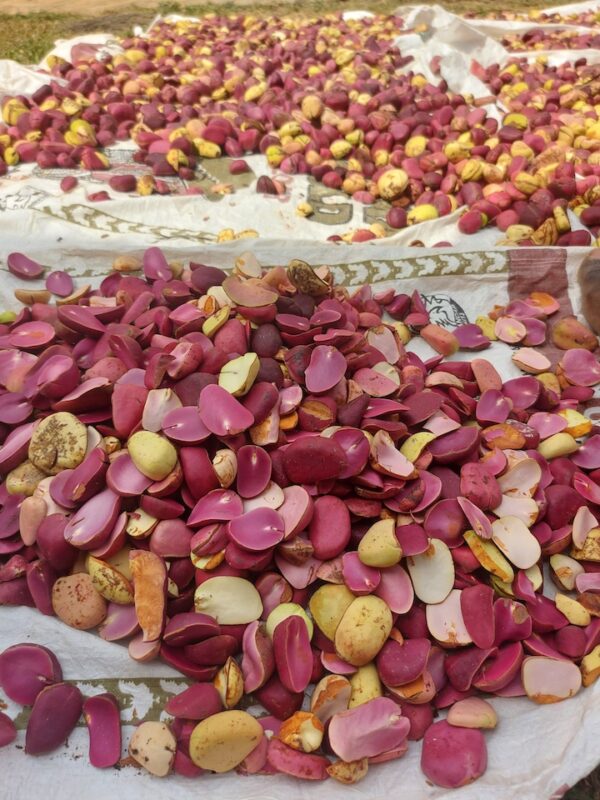The kola nut, derived from the Cola Nitida and Cola Acuminata trees, is a remarkable natural gift from West Africa with a rich history of traditional use. Often associated with its role in flavoring soft drinks, the kola nut harbors a treasure trove of health benefits that extend far beyond mere refreshment. Here, we delve into ten amazing health advantages of kola nuts, some of which you probably didn’t know.
1. Banishing Fatigue and Regulating Appetite
Kola nut, with its natural caffeine content, has long been used to combat fatigue and effectively suppress hunger. The energizing properties of the kola nut can provide a revitalizing pick-me-up and help manage appetite, which can be particularly helpful in weight management.
2. Sweetening Stale Water
One of the most intriguing characteristics of kola nuts is their ability to sweeten otherwise unpalatable or impure water. In regions where clean drinking water is a luxury, kola nuts come to the rescue, making water consumption a more pleasant experience.
3. Combatting Infections
Kola nuts boast impressive antibacterial and antifungal properties, making them a valuable tool in the fight against infections. Whether you’re dealing with common illnesses or more serious health concerns, kola nuts can be a natural solution.
4. Aiding a Variety of Skin Conditions
Kola nuts are versatile in skin care, offering relief from a wide range of issues. They can be used topically to treat ulcers, soothe toothaches, and alleviate gum pain, providing a natural remedy for oral and dermal discomfort.
5. Alleviating Headaches and Easing Morning Sickness
Kola nut’s stimulating properties have been known to provide relief from headaches, and it’s also been used traditionally to reduce morning sickness in some cultures. The caffeine content in kola nut can contribute to these beneficial effects, offering a natural remedy for such discomforts.
6. Facilitating Tough Labor and Menstrual Regulation
In traditional medicine, kola nuts have been employed to ease the challenges of labor. Moreover, they’re credited with the ability to help regulate menstrual cycles, making them a valuable resource for women’s health and well-being.
7. Enhancing Mental Well-Being
Mental health is of paramount importance, and kola nuts may play a role in supporting it. Some believe that these nuts have a positive impact on mental well-being, assisting in managing symptoms of conditions such as depression and anxiety.
8. Easing Respiratory Problems
Respiratory issues can be quite burdensome, but kola nuts can offer relief. They can help alleviate respiratory problems like asthma or bronchitis, improving breathing and overall well-being.
9. Boosting Energy and Curbing Appetite
Caffeine, a natural stimulant found in kola nuts, lies at the core of many of these health benefits. It enhances energy levels while effectively reducing appetite. This dual action can assist in weight management and promote a more active lifestyle.
10. Elevating Mental Clarity and Enhancing Respiratory Health
The kola nut, with its wealth of remarkable health benefits, has made a significant impact not only as a flavoring agent but also as a vital component of traditional medicine. This humble nut, sourced from the Cola Nitida and Cola Acuminata trees, stands as a testament to nature’s extraordinary healing power, contributing to enhanced mental clarity and supporting respiratory health. Whether you seek a remedy for common ailments or aspire to improve your overall well-being, the kola nut offers a natural path to well-rounded health.
How To Safely Source for Your Kola Nut (Cola Nitida & Cola Acuminata) Produce
If you find the right export company, buying directly from them can make the purchase process easy and stress-free, when compared with doing the sourcing on your own. That said, there are few things to note when dealing with an export company in Nigeria or Africa. The specific requirements for Nigeria are listed below, but they mostly apply to other African countries:
- The exporting company must be registered with the Corporate Affairs Commission (CAC) to make sure the company is registered and permitted to carry out business operations.
- The export company must also be registered with the Nigerian Export Promotion Council (NEPC).
- The company must possess a domiciliary account to accept international payments.
- The company should get all necessary export-related documentation done before the shipment leaves the port of origin. Some of the documents are:
- Certificate of origin
- Bill of lading
- Inspection Certificate (SGS, Cotecna, Bureau Veritas, Intertek, etc)
- Phytosanitary certificate
- Fumigation certificate
Where To Find Reliable Exporters
An important question that still needs to be answered is how to find kola nut exporters in Nigeria. You can use any of the methods listed below:
- Attend trade fairs
- Use search engines like Google, Yahoo, etc.
- Search for agents on Linkedln
- Sign up on trade platforms (e.g. Alibaba, Tradeford, Go4WorldBusiness)
- Neogric offers a reliable global order fulfilment solution for kola nut and other agric produce. Our end-to-end supply chain solution makes the export of quality kola nut easy, quick and safe. From the point of placing your order till it successfully gets delivered, we ensure you have nothing to worry about.
International Price of Kola Nut (Cola Nitida & Cola Acuminata) Per Metric Ton
The unit price ($ per kg) of kola nut in the international market depends on a host of different factors including:
- The grade of the produce (usually the more the processing, the higher the price)
- The price of the raw material
- Age of the seeds (this can affect the price)
- The quantity ordered (the greater the quantity, the cheaper you can get it per ton)
- Harvest season (it is more costly when it is out of harvest season).
- Freight & haulage cost
- Percentage of markup
- Import duties
- Distance from the country of origin
- Technology/Infrastructure available in country of origin
- Relationship between the buyer and seller
That said, as at October 2023, Kola nut (Cola Nitida & Cola Acuminata) costs between $2,500 and $4,800 per metric ton (1,000 kilograms) in the international market (i.e. $2.5/kg to $4.8/kg).
How To Pay For Your Kola Nut Produce
You can pay for your kola nut using different methods, but three of the popular ways of paying for your agric produce are:
- Bank (T/T) Payment
- Advance Payment
- Letter of Credit (LC)
Bank Payment (T/T)
Bank payment is also known as T/T, “Telegraphic Transfer” or “Telex Transfer” In other words, it is an international wire of funds from the buyer’s bank to the seller’s bank.
A T/T is technically not the same as a wire transfer, which is often done through the SWIFT network. However, when a seller or supplier asks for a T/T payment, a wire transfer is what they are really asking for.
The wire transfer based on the SWIFT system is the most common payment method in international trade. Typically, it takes 3-5 working days to clear, and generally costs between 25 and 50 USD, depending on your agreement with the commercial department in your bank.
Advance Payment
There are sellers that will demand anywhere from 30% to 50% advance payment, and for good reason. If both parties have done deals in the past, sellers can ask for a percentage of the sales (about 30%) before they ship the produce and they can request for the remaining amount after a scanned copy of the Bill of Lading has been sent to the buyer.
It is the safest option for exporters and it also guarantees that they will have some funds to help with sourcing. It is popular among manufacturers on B2B marketplaces like Alibaba and also with commodity traders.
However, advance payment carries considerable risk for the importer (buyer) because the exporter (seller) might not be under as much pressure to ensure quality checks compared with a stricter form of payment. Some might even disappear entirely.
Having said that, advance payment is very useful and is widely used. For instance, the seller might need to secure the commodity in the face of increased competition. It can also be used when the exporter needs some money for sourcing the produce or for processing raw materials.
The most important thing is for both importer and exporter to build mutual trust by having a track record of successful deals with each other or other known companies.
Letter of Credit
Letter of Credit is an agreement generated by the bank of the buyer, guaranteeing payment once certain conditions are met. It is one of the safest types of payment available to both buyer and seller.
Some of the types of Letter of credit are:
- Commercial Letter of Credit,
- Sight Letter of Credit
- Transferrable or Non-Transferable Letter of Credit
- Standby Letter of Credit (SBLC)
- Usance or Deferred Payment Letter of Credit
- Revocable or Irrevocable Letter of Credit
- Confirmed or Unconfirmed Letter of Credit
- Revolving Letter of Credit
- Green Clause Letter of Credit
- Red Clause Letter of Credit
L/Cs are not totally safe (for either buyer or seller) too. For instance, sellers can ship substandard products or those that are different from the ones agreed upon. In this case, the seller gets paid and the buyer receives good he cannot use.
And speaking of the dangers of L/Cs for the exporter, the conditions in the Letter of credit might be practically impossible to fulfil; if an exporter agrees to such, he might be unable to receive payment. A report stated that of the letters of credit received in the UK, 50% are unworkable while 70% are rejected by the banks for payment.
Shipping & Delivery Terms
When shipping your products, it is important to take note of a few factors:
Order Quantity
For smaller shipments, airfreight is often the preferred option but as the order volume increases, sea freight could become significantly cheaper. Usually when the order is close to a full container load (20 ft), sea freight is used. Despite all these, the Covid-19 pandemic has caused an increase in cost of delivery of products.
Cost of Delivery
When the order is of a large volume, sea freight often turns out cheaper than air freight. In fact, airfreight could be up to 6 times more costly than sea freight if the volume is large enough.
Time of Delivery
Sometimes, time will be more important to the buyer than the cost of delivering the produce. In this case, air freight will be the logical option (as stated above, the cost will be more). But if you have more time as a buyer, you should strongly consider using sea freight.
Incoterms
Incoterms refer to generally accepted shipping and payments terms. For example, buyers that have representatives in the source country or that can negotiate with the freight company can use the Free of Board (FOB) terms, since it gives them more control and can save them some money.
However, if the shipment is small or the buyer doesn’t have an extensive network to effectively handle payment for freight, insurance and port charges, he will be better off choosing the Cost-Insurance-Freight (CIF) payment option. You can find out more about Incoterms here.
Import Kola Nut (Cola Nitida & Cola Acuminata) The Right Way with Neogric
Neogric is a trusted global order fulfilment and sourcing solution company with deep expertise in the Kola Nut industry. Our end-to-end supply chain solution makes the export of quality kola nut easy, quick and safe. Whichever region of the world you are, be it Europe, Asia, USA, Canada, Africa, South America or Oceania, you can reliably order your agric products and we will ensure it is successfully delivered to you.
Our Kola Nut trade specifications are listed below:
- Origin: Nigeria
- Product Name: Kola Nut (Cola Nitida & Cola Acuminata)
- Product Types: Kola Nitida (Red, White)
- Physical Specification: Based On Buyer’s Specification
- Quantity: Based On Buyer’s Specification
- MOQ: 20 Metric Tonnes
- Trade Process: Ex Works/FOB/CIF
- Moisture Content: 8% Max
- Admixture/Impurities: 2% Max
- Other Colours: 5% Max
- Inspection: SGS/Cotecna/Intertek/Bureau Veritas
- Packaging: Based On Buyer’s Specification
- Payment Method: TT (Bank Transfer) or L/C
- Shipping Time: 15 to 25 Days After Confirmation of TT or L/C
- Loading Port: Lagos, Nigeria or Tema, Ghana
Expected Shipping Documents
- Bill of Lading
- Certificate of Origin
- Phytosanitary Certificate
- Fumigation Certificate
- Commercial Invoice
- Packing List
Contact Neogric
Tel: +2348147860157
Email: neo@neogric.com
WhatsApp:
Get Your Agric Products Safely, Quickly And Cheaply
Click the button below and tell us which product you need. We will be glad to help you export them based on agreed terms.
Agric Market Articles & Insights
- 10 Amazing Health Benefits of Kola Nut (Cola Nitida & Cola Acuminata) You Probably Didn’t Know
- Top 30 Global Suppliers and Exporters of Kola Nut (Cola Nitida & Cola Acuminata)
- Dried Split Ginger: Complete Guide on Import/Export From Nigeria & Africa
- Kola Nut Powder: Complete Guide on Import/Export From Nigeria & Africa
- Dried Kola Nut: Complete Guide on Import/Export From Nigeria & Africa
- Kolanut: Uses, Health Benefits, Side Effects and Purchase
- Shea Nut: Uses, Health Benefits, Side Effects and Purchase
- 5 Highly Profitable Categories of Agric Produce in Africa
- Moringa: Uses, Health Benefits & All You Need To Know
- Organic Fertilizer: All You Need To Know About The Benefits, Procedures & Best Practices
- Top 7 Traditional Uses Of Kolanut
- Chili Pepper: Complete Guide on Import/Export From Nigeria & Africa
- Chili Pepper Medicinal Application and Health Advantages
- 10 Amazing Uses and Health Benefits of Bitter (Garcinia) Kola You Probably Don’t Know
- The Health Benefits & Uses of Sorghum You Should Know
- Cashew Nut Kernels: Complete Guide on Import/Export From Nigeria & Africa
- Top 10 Most Profitable Agriculture Business Ideas 2024
- Shea Nut: Complete Guide on Import/Export From Nigeria & Africa
- Bitter (Garcinia) Kola: Complete Guide on Import/Export From Nigeria & Africa
- Kola Nut: Complete Guide on Import/Export From Nigeria & Africa


